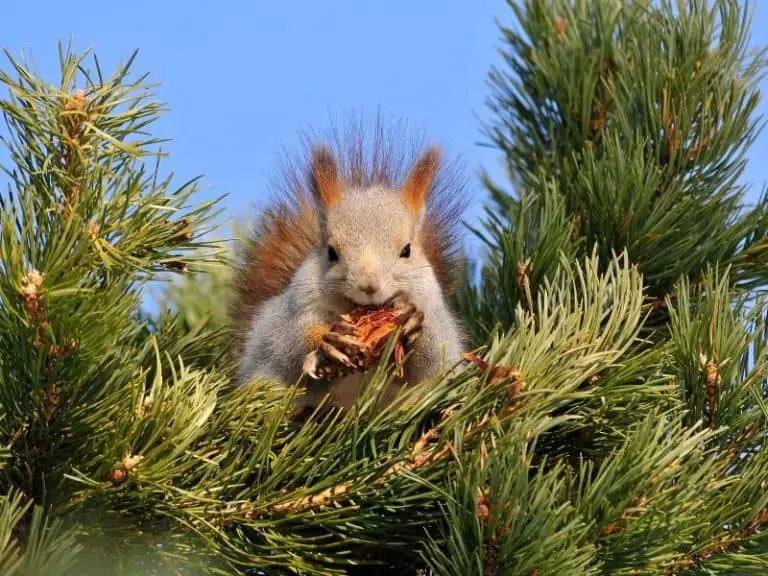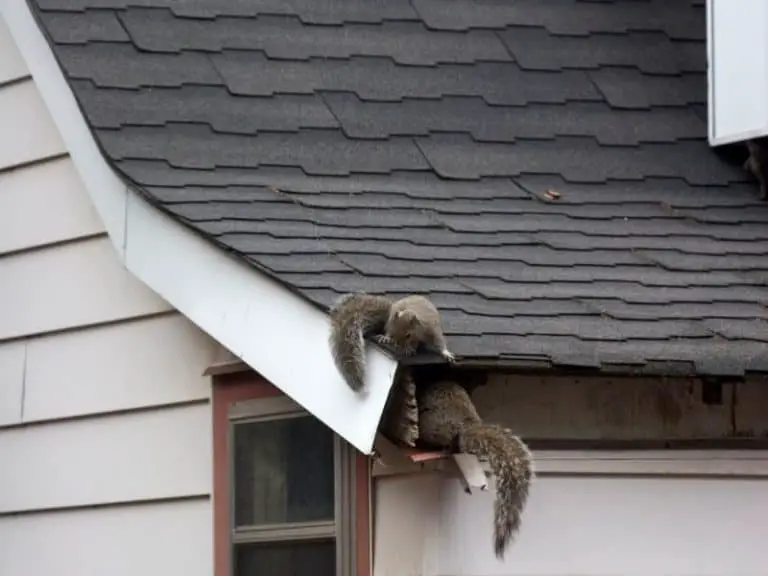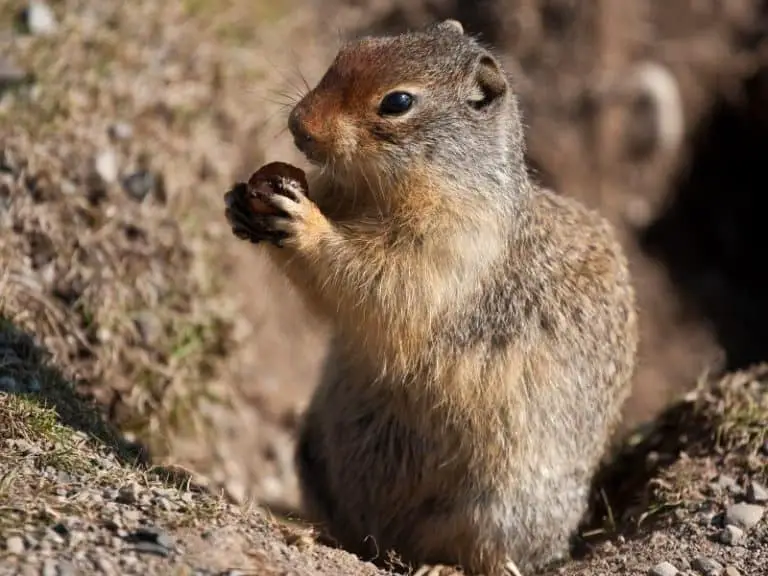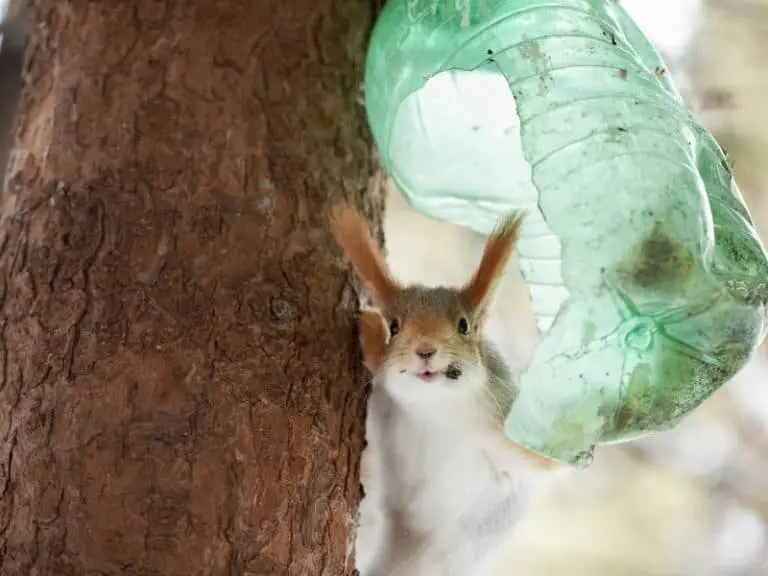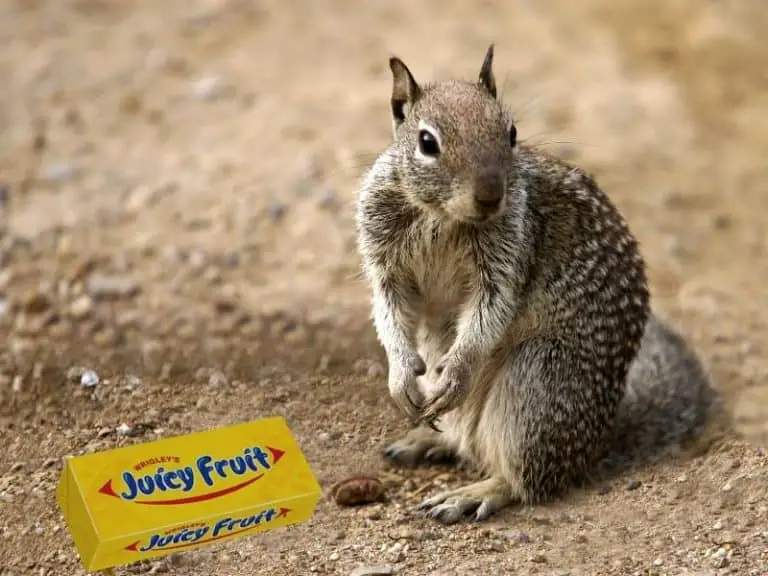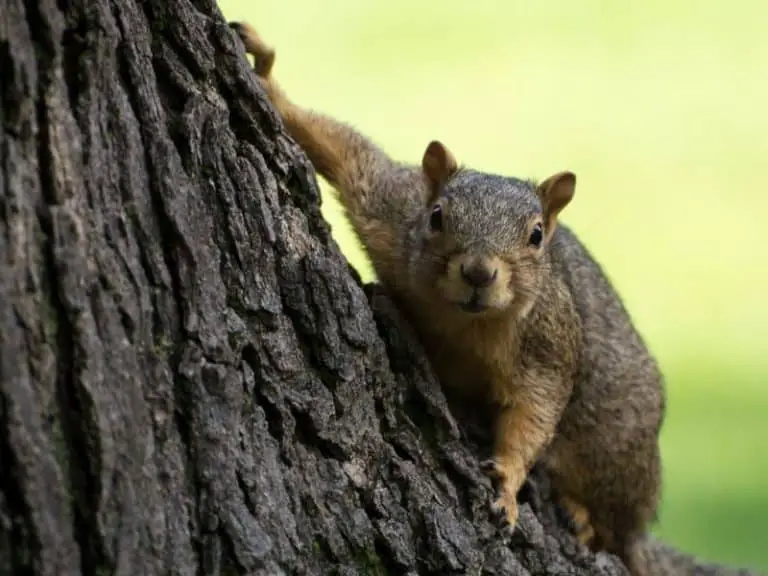How to Keep Squirrels from Climbing Trees
You need to know how to keep squirrels from climbing your trees because even if you might enjoy looking at them with their cuddly and cute appearance and antics, that’s about the only thing you can appreciate about them.
Once they begin to invade your property, destroy your trees, dig on your yard, eat your birdseed and plants, and wreak significant damage to your home, they stop being fun little creatures and begin to become pests.
To keep squirrels from climbing trees, wrap tin, aluminum, or metal sheets around the trees. Repel squirrels with hot pepper, essential oils, certain plants and flowers, mulch, and sticky material. Trim branches. Net your fruits, trees, bulbs, and other plants.
Squirrels will always be attracted to trees.
This is because trees have a lot of benefits to them, such as serving as a home, food source, protection, and more.
And if they have colonized your trees, it will just be a small step for them to go inside your home next. Your trees are also important sources of income, particularly the fruit-bearing ones.
They also offer protection and shelter and keep your property ecologically healthy. It is therefore important to know in detail how to keep them away from your trees.
How To Keep Squirrels From Climbing Trees
We will show you the best and most effective ways of keeping squirrels from trees. Although these may not completely keep them out, it will significantly prevent them from climbing and damaging your trees.
Plant squirrel-repelling flowers
It may come as a surprise to you that some plants actually repel squirrels, despite these animals’ generalist preferences. Try to plant these flowers to help keep squirrels out of your property.
Despite not being particularly picky animals, they may still be deterred by the following plants:
- Lily of the Valley
- Hyacinth
- Fritillaries
- Galanthus
- Daffodils
- Geraniums
- Nasturtiums
- Mustard
- Marigold
These flowers deter squirrels either due to their strong repellent odor or their bright colors.
The great thing about brightly-colored flowers is that they contribute to the beauty of the garden, and these plants, also help keep squirrels away and prevent the damages they cause.
You may try to create a barrier with these plants around your garden or yard.
Use tin foil and other physical barriers
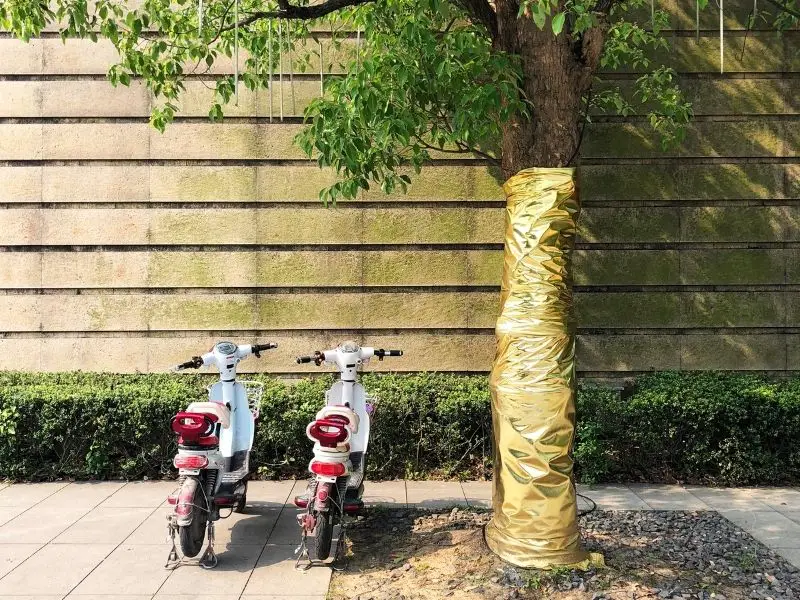
This technique involves using a strong aluminum or tin sheet and wrapping it around the bark of the tree. The sheet that is wrapped around it will prevent squirrels from climbing it.
Be careful about using this technique because it can cause deformation to the tree.
In addition, it may not completely prevent the squirrels from climbing the tree if there is access to the tree from the roof and branches or from the branches of adjacent trees.
You can also use simple metal collars that are two to three feet wide around tree trunks. This is especially helpful in protecting the fruits from being eaten, and it protects the canopy as well.
The thin sheet metal can have metal snips, and you can make it large enough to encompass the diameter of your tree. It can be positioned about six feet from the ground.
You can attach its ring with wire by looping the wire in a metal spring from one side, then twisting it on itself to secure it on the metal spring.
You can wrap this wire around the collar and thread its end through the spring’s other side.
Pull it taut against your metal collar. Then twist back the wire onto itself on your spring to secure it. More than one wire may be needed. Your springs allow your tree room for growth.
Use hot pepper and/or peppermint
Hot pepper is a squirrel deterrent.
You can make a homemade mixture of this substance by mixing one tablespoon of hot pepper powder with two cups of water. This solution is then put in a sprayer.
Alternately, you can also spread hot pepper powder around your tree, as well as use hot pepper oil or capsaicin.
Making the spray solution is simple, but applying it effectively is more challenging. One limitation of this solution is its susceptibility to be washed off by rain.
In addition, to make the spray effective in protecting the entire tree, you will need a considerable amount of solution to cover most of the tree’s areas that need to be sprayed to deter the squirrels.
Some sweet odors also repel them, like the scent of peppermint, mint, and various essential oils. For instance, this repellent is excellent against squirrels.

Manage tree growth and planting
Some aspects of planning, managing, and maintenance of trees are geared towards preventing squirrels from climbing your trees.
For example, you can keep the tree branches trimmed near your home, building, or other structures to prevent them from using these tree limbs as access points both to the tree and your structure.
From the beginning, also try to consider planting trees at better sites that are not prone to squirrel infestation.
Nonetheless, total protection of trees and their fruits from squirrels may not be 100% possible, because these creatures are amazingly adept at climbing.
You can also put nets at the crown of your trees to protect the fruit buds and young fruits from being eaten by these animals.
Using poison and other lethal means
If you ever feel you are starting to lose the battle against squirrels damaging your trees, you might get tempted to poison them or otherwise use lethal methods.
Sometimes, this is not advisable.
You must know the species you are dealing with because some species of squirrels are being conserved and it is illegal to kill them.
You may be held liable and pay a fine or be charged.
More importantly, traps and poisons can unexpectedly cause harm to children and pets.
While trapping could be effective in eliminating squirrels, you will need to release them in an appropriate and wild habitat that is legally acceptable.
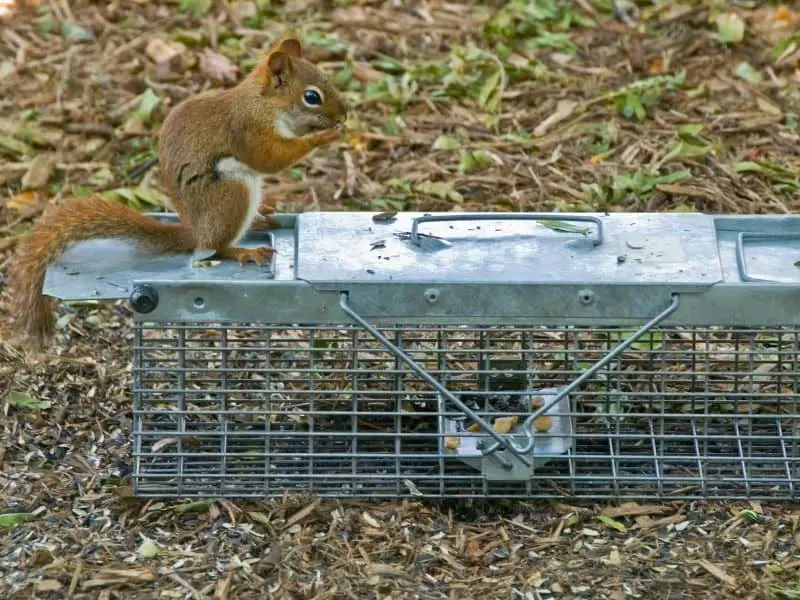
Scare squirrels with streamers and flags
You may also try scaring squirrels away to discourage them from being attracted to your trees.
People have used streamers and flags, which scare squirrels when they flutter in the trees. This method, while not foolproof, is simple and safe for all.
Use fake predators
You can take a cue from farmers who put up scarecrows in their fields and apply the same principle to squirrel pests.
You can try to put a figurine or statue of squirrel predators, and see if they can scare away the critters.
They may ruin your aesthetic sense, but you can probably position them or choose figurines that are pretty and will add to the charm of your yard.
The principle here is that the silhouette or shadow of an owl may scare squirrels and send them scurrying. These rodents are naturally skittish, and the sight of a predator capable of harming them may keep them away, hopefully for good.
If you decide to put such a decoy, like a fake owl, you need to move it around once in a while to keep squirrels from getting used to it.
Get a dog
You can use dogs to prevent squirrels from climbing trees.
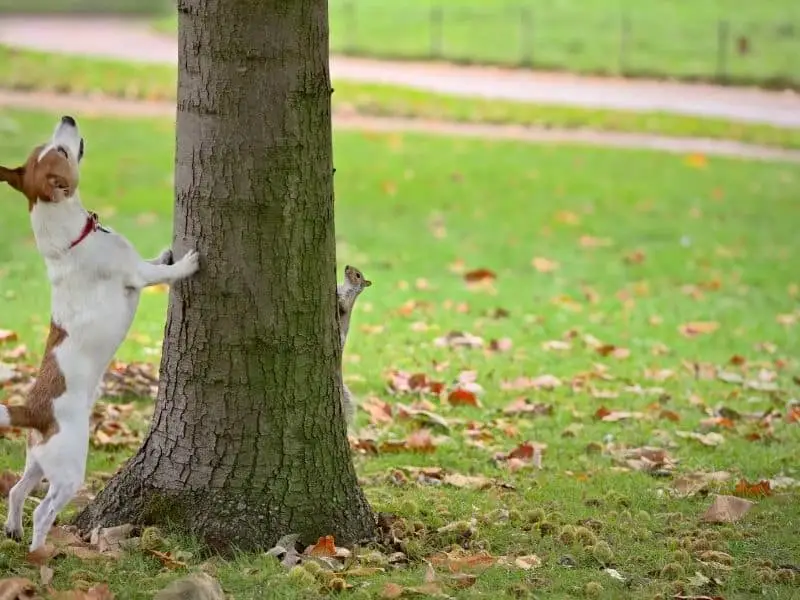
If your tree is inside a fenced area, you can have your dogs run loose in the fenced backyard. This will scare away squirrels, dispersing them to look for safer habitats elsewhere.
The disadvantage of this technique is that it can cause squirrels to climb even higher up the tree and possibly cause more damage in the branches, bark and other parts of the tree there.
Another limitation of this technique is that your dogs may not always be in the yard to be on the lookout for the squirrels.
Hire a pest control professional
You might find it more effective to just contract the services of pest control companies who have the needed expertise in formulating and implementing a sound and holistic pest eradication program.
This is due to the fact that eradicating squirrels on your own and preventing them from climbing trees may be an uphill battle.
Pest control professionals can humanely and safely save your trees from the ravages of a squirrel invasion once they have thoroughly assessed your area and the level of squirrel infestation in your property.
Hiring experts can save you time, effort, and ultimately, money, because they are actually more effective.
The experts also have the advantage of having experience as part of their arsenal against squirrels. They have a better chance of eliminating your squirrel problem more quickly and permanently.
How Squirrels Damage Trees
The trees that are most at risk for damage from squirrels include fruit trees, hornbeam, sycamore, beech, pine, and lark trees.
They can, however, inflict damage on all other trees they use and see. With time, trees can have extensive damage to them if these squirrels are not stopped.
Firstly, squirrels damage trees by stripping their bark away. Tree bark has a lot of uses for squirrels. They use them as a source of food and water, as well as something to chew on.
This debarks trees, which cause them to rot and become deformed.
Eventually, squirrels can cause enough damage to kill these trees. Chewing on bark also causes tree wounds, and these open wounds are prone to decaying and fungal infection.
Squirrels not only gnaw on tree bark, but also gnaw on tree limbs, particularly their base. If squirrels chew and gnaw enough of these branches, they can pose a danger when they fall away.
In addition, if they chew and gnaw on growing branches, the branches fail to grow properly, causing the tree to eventually become deformed.
Squirrel-proofing your trees will prevent them from eating the young fruits (if they are fruit trees). Eaten fruit tree buds cause limited fruit production and stunted growth.
It also prevents the critters from accessing phone lines and power lines, which would cause service disruption if damaged by these rodents.
Preventing squirrels from climbing trees also helps prevent them from eventually invading your home and chewing their way inside.
With the help of trees, they can access your home and nest in various areas of the house such as the attic and crawlspace.
Squirrels also cause other associated damages around your property. They eat new and tender plants and dig up plant bulbs and destroy the beauty of your garden.
How To Keep Squirrels Out Of Your Property
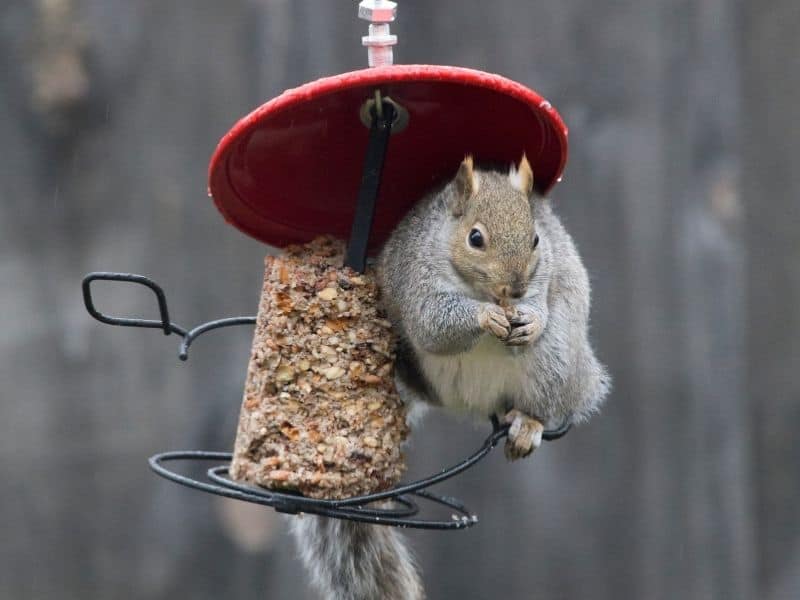
Part of keeping squirrels from climbing trees involves keeping them away from your property in general.
If you can prevent them from being around, then it follows that they will not be there to climb your trees.
And so, you also need to implement measures on keeping squirrels away from your immediate surroundings. Let us see how we can do that with the following suggestions.
Repel them with strong scents
There are particular odors that squirrels do not like, including the scents of black pepper, garlic, and white pepper.
To apply these scents, you can spray water on your flowers and plants, then sprinkle these substances on them. Apply them as often as necessary, especially after rain and storm, because they get washed away.
If you can acquire it, you can also try sprinkling urine of squirrel predators such as foxes, if they are naturally present in your area. If squirrels smell their predator in the area, it is not an encouragement for them to hang around.
There are commercially available repellents that mimic these odors. Red fox and coyote urine apparently work best and are worth trying out.
You can also spread cat, dog, and human hair around your yard, which also have predator odors. You may cover these hairs with some bits of soil in order to prevent them from being blown away.
You can also probably find other ways to fix them in your yard, such as using plastic bags with holes on them. Reapply these hairs once per year or as necessary.
If the squirrels have invaded the attic, you can douse towels with apple cider vinegar as a repellent. Be sure to reapply it on your towels to keep the repellent potent and effective.
Remove food and water sources
Aside from trees, fruits, and nuts, there are other food and water sources that attract squirrels into your yard.
Birdseed in birdfeeders, food in trash bins, and leftover food for dogs and cats left outside are all invitations for squirrels to stay and make themselves at home.
It would be best if all of these sources are completely removed.
However, some cannot be avoided; for example, if you want to keep your birdfeeders. In the case of this example, you can make your birdfeeder squirrel-proof.
Trees will naturally have fallen berries, nuts, acorn, and fruit, and you should keep raking them up or picking them whenever they get scattered on the ground.
This may be labor-intensive, but doing so diligently will keep squirrels from being attracted to them and being encouraged to go to your yard.
Apply chew-deterrent flavors
If you have redwood furniture or other wood or things that squirrels love to chew, you can apply hot sauce on their legs by rubbing it on them. You can use a piece of cloth or rag to do this.
The next time squirrels try chewing on the furniture, they will taste the unpleasant flavor and will not chew on them again.
Water down bulbs
When you have plant bulbs, you can discourage squirrels from digging them by watering down the surrounding soil on top of it.
Freshly disturbed soil is attractive to squirrels because they look like there are nuts placed in it by other animals.
Thoroughly watering the soil will cause it to settle firmly into the ground, so that it will not look as interesting to squirrels.
Use netting as protection
Alternately, you may also lay a patch of chicken wire over your bulbs. Secure it in place by weighing it down with heavy objects like rocks.
You can remove it once it has experienced some serious rainfall. You can also similarly opt to put black plastic over your bulbs as netting for protection.
For other plants like eggplant, berry bushes, and tomatoes, you can put netting to cover them as well.
Protect with hot cayenne pepper

As we discussed previously, you can also protect particular plants by sprinkling cayenne pepper around the yard and garden. Put this on specific plants that you do not want squirrels to come near to.
Add mulch around
You can also keep out squirrels out of certain areas of your garden by adding mulch on the ground, because squirrels hate how it feels when they walk over it.
Related Questions
What kind of food will squirrels find irresistible?
It has been found that since squirrels love seeds and nuts, they naturally want peanuts coated in peanut butter. You can use this as the ideal squirrel bait, which you can use for trapping them.
Is Juicy Fruit gum harmful to squirrels?
It has been said that bubble gum clogs the intestines of squirrels and probably bursts their stomach. However, no scientific studies have been conducted to confirm this.
Sources
- https://www.angieslist.com/articles/what-best-squirrel-bait.htm
- https://askinglot.com/does-juicy-fruit-gum-kill-ground-squirrels
- https://www.gardeningknowhow.com/edible/fruits/fegen/squirrel-proof-fruit-trees.htm
- https://www.squirrelcontrol.ca/blog/how-do-you-stop-squirrels-from-climbing-your-trees/
- https://thebiggreenk.com/keep-squirrels-away/
- https://www.wikihow.com/Keep-Squirrels-Away
Photo credit: ©canva.com
Medical Disclaimer: TheHomePestControl is a digital publisher and does not offer personal health or medical advice. The contents of this website are not intended to substitute for professional medical advice, diagnosis, or treatment.
Affiliate Disclaimer: As an Amazon Associate, I earn from qualifying purchases made on our website. If you make a purchase through links from this website, I may earn a commission at no additional cost to you.

